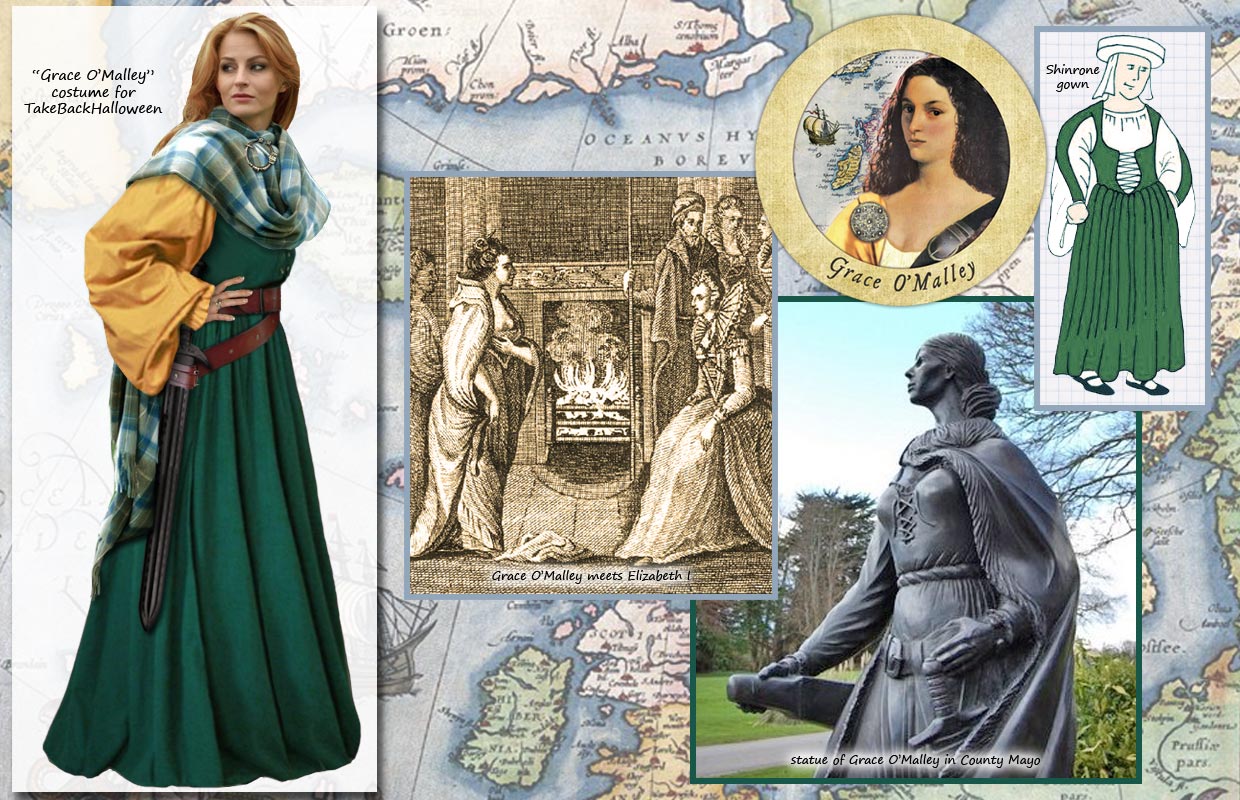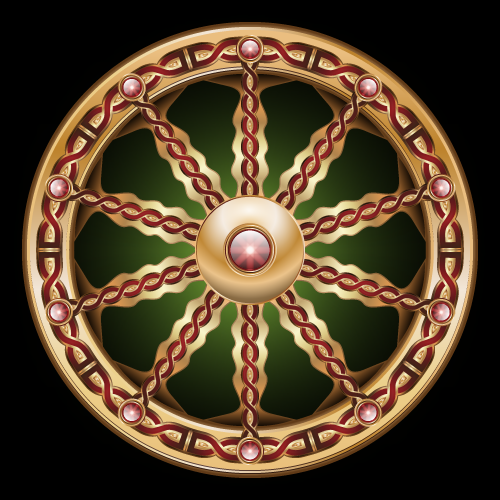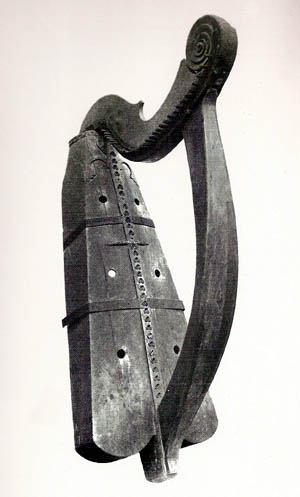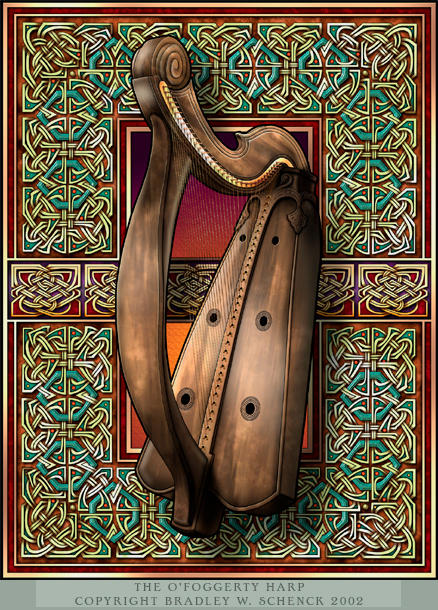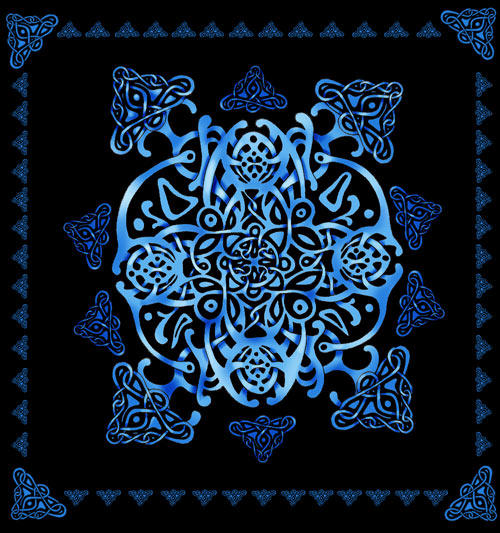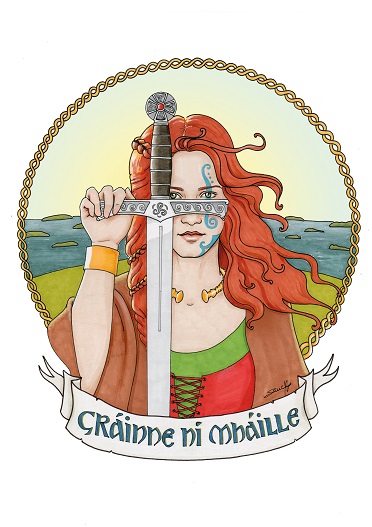 |
|
|
| Gráinne Mhaol (Grace O'Malley), la reina pirata de Connacht |
Oró Sé do Bheatha 'Bhaile (Hurra, bienvenida a casa) es una canción popular irlandesa que ha tenido muchos usos a lo largo de su historia. Parece ser que la música fue marcha de un clan y también que el estribillo se le cantaba a la novia cuando entraba en la casa del novio. O que incluso sirvió como apoyo a la causa jacobita, haciendo referencia a Bonnie Prince Charlie. Tal como se canta ahora, es el resultado de los versos que le fueron añadidos a comienzos del siglo XX por el poeta nacionalista Patrick Pearse, que sería cantada en el Levantamiento de Pascua (1916) por los Voluntarios Irlandeses, sirviendo desde entonces como símbolo de la resistencia. Esta última versión hace referencia a Gráinne Ní Mháille, la "reina pirata" de Connacht.
Oro, sé do bheatha a bhaile, is fearr liom tu ná céad bo bainne:
Oro, sé do bheatha a bhaile, thá tu maith le rátha.
|
Oro, welcome home,
I would rather have you than a hundred milch cows:
Oro, welcome home,
’tis you are happy with prosperity [in store for you].
|
Farney version
Hó, ró, ró, ’sé do bheatha un a’ bhaile,
Hó, ró, ró, ós cionn duine eile ;
Hó, ró, ró, ’sé do bheatha un a’ bhaile,
Tá tú amuigh le ráithche.
|
Hó, ró, ró, welcome home,
Hó, ró, ró, above anyone else ;
Hó, ró, ró, welcome home,
You’ve been gone three months.
|
Jacobite version
A Shéarlais Óig a mhic Ríogh Shéamais,
’Sé mo mhór-chreach do thriall as Éirinn,
Gan aon ruainne bróig’ ort, stocaí nó léine,
Acht ’do chascairt leis na Franncaighibh.
Chorus:
Óró, sé do bheatha abhaile,
Óró, sé do bheatha abhaile,
Óró, sé do bheatha abhaile,
Anois ag teacht an tSamhraidh !
’Sé mo léan géar nach bhfeicim,
Mur’ mbéinn beó ’na dhiaidh ach seachtmhain,
Séarlas Óg is míle gaiscidheach
Ag coscairt leis na Franncaighibh.
Chorus
Tá Séarlas óg ag triall thar sáile,
Béidh siad leis-sean cúpla gárda,
Béidh siad leis-sean Franncaigh is Spáinnigh,
Agus bainfidh siad rinnc’ as Éir’cighibh.
Chorus
|
Young Charles, son of King James
It's my great distress – your exile from Ireland
Without thread of shoe on you, socks or shirt
But fighting alongside the Frenchmen.
Chorus:
Oh-ro, You're welcome home,
Oh-ro, You're welcome home,
Oh-ro, You're welcome home,
Now that summer's coming!
Alas that I do not see
If I were alive afterwards only for a week
Young Charles and one thousand warriors
Fighting with the Frenchmen
Chorus
Young Charles is coming over the sea
They’ll be with him as a guard
They’ll be with him, French and Spanish
And they'll make the heretics dance!
Chorus
|
Patrick Pearse version
'S é do bheatha, a bhean ba léannmhar
Dob’ é ár gcreach do bheith i ngébheann,
Do dhúthaigh bhreá i seilbh méirleach,
'S tú díolta leis na Gallaibh.
Chorus:
Óró,'s é do bheatha abhaile,
Óró,'s é do bheatha abhaile,
Óró,'s é do bheatha abhaile,
Anois ar theacht an tsamhraidh,
A bhuí le Dia na bhfeart go bhfeiceam,
Muna mbímid beo ina dhiaidh ach seachtain,
Gráinne Mhaol is míle gaiscíoch
Ag fógairt fáin ar Ghallaibh.
Chorus
Tá Gráinne Mhaol ag teacht thar sáile,
Is Fianna Fáil 'na mbuidhin gharda,
Gaeil féin 's ní Francaigh ná Spáinnigh,
Is ruagairt ar na Gallaibh!
Chorus
|
'Se do bheatha, O woman that wast sorrowful,
What grieved us was thy being in chains,
Thy beautiful country in the possession of rogues,
And thou sold to the Galls,
Chorus:
Oró, 'se do bheatha a bhaile,
Oró, 'se do bheatha a bhaile,
Oró, 'se do bheatha a bhaile,
Now at summer's coming!
Thanks to the God of miracles that we see,
Altho' we live not a week thereafter,
Gráinne Mhaol and a thousand heroes
Proclaiming the scattering of the Galls !
Chorus
Gráinne Mhaol is coming from over the sea,
The Fenians of Fál as a guard about her,
Gaels they, and neither French nor Spaniard,
And a rout upon the Galls !
Chorus
|
Modern version
’Sé do bheatha, a bhean ba léanmhar
do bé ár gcreach tú bheith i ngéibhinn
do dhúiche bhreá i seilbh meirleach
is tú díolta leis na Gallaibh.
Chorus:
Óró, sé do bheatha abhaile
óró, sé do bheatha abhaile
óró, sé do bheatha abhaile
anois ar theacht an tsamhraidh.
Tá Gráinne Mhaol ag teacht thar sáile
óglaigh armtha léi mar gharda,
Gaeil iad féin is ní Gaill ná Spáinnigh
is cuirfidh siad ruaig ar Ghallaibh.
Chorus
A bhuí le Rí na bhFeart go bhfeiceam
muna mbeam beo ina dhiaidh ach seachtain
Gráinne Mhaol agus míle gaiscíoch
ag fógairt fáin ar Ghallaibh.
Chorus
|
Hail to you sorrowful woman
it was our woe that you were in captivity
your fine country in the possession of thieves
while you were sold to the foreigners.
Chorus:
Hurrah, welcome home
Hurrah, welcome home
Hurrah, welcome home
now at the coming of Summer.
Gráinne Mhaol is coming over the sea
armed warriors as her guard
they are Gaels, not foreigners or Spaniards
and they will put the foreigners to flight.
Chorus
Thanks to the King of Miracles that we might see
although we might not live but a week after
Gráinne Mhaol and a thousand heroes
declaring the scattering of the foreigners.
Chorus
|
La canción ha sido cantada en su forma tradicional por The Clancy Brothers, The Dubliners, The Cassidys, Noel McLoughlin, The McPeake Family, Thomas Loefke, Norland Wind o the Wolfe Tones.
Y en versión más actualizada por John Spillane, The Twilight Lords, Cruachan, Tom Donovan o Sinéad O'Connor.
